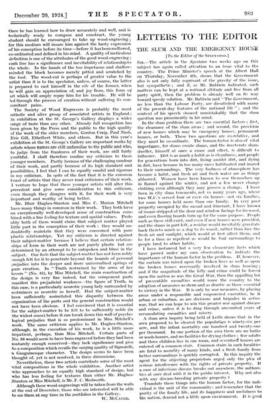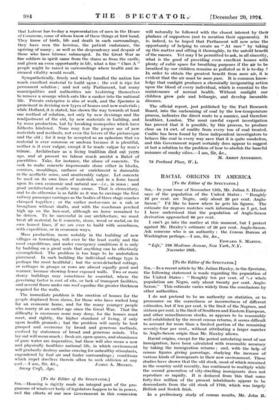LETTERS TO THE EDITOR
THE SLUM AND THE EMERGENCY HOUSE
[To the Editor of the SrEer.vroa.] Sm,—The article in the Spectator two weeks ago on this subject has again called attention to an issue vital to the country. The Prime Minister's speech at the Albert Hall on Thursday, November 4th, shows that the Government
also is not only fully cognisant of the gravity of the issue, but sympathetic ; and if, as Mr. Baldwin indicated, such matters can be kept at a national altitude and free from all party spirit, then the problem is already well on its way toward speedy solution. Mr. Baldwin said "The Government, no less than the Labour Party, are dissatisfied with many of the present-day features of the national life" ; and the context of his speech showed unmistakably that the slum question was prominently in his mind.
In the slum problem there arc two essential factors : first, the clearance of the slum areas ; and second, the provision of new houses which may be emergency houses, permanent houses, or both. These two questions are co-relative, and they must be co-ordinate. The human factor is also of vital importance, for slums create slums, and the inveterate slum- dweller, himself at once a cause and effect, is difficult to influence. Dirt is as much a habit as is cleanliness, and people for generations born into dirt, living amidst dirt, and dying in dirt, have become in too many cases habituated and inured to their surroundings. The very foulness of atmosphere has become a habit, and fresh air and fresh water are as things abhorred. Women have been known to sew themselves up in flannel against the winter, and not a few never change clothing even although they may possess a change. I have been in city slum tenements, not so many years ago, wile' c
two W.C.'s served four or even six houses—not six families, for some houses held more than one family. In very poor property occupied by the casual and itinerant, I have known of rooms stripped of the door and window facings for firewood, and even flooring boards torn up for the same purpose. People such as these still exist, and even if new houses were provided, and the slums in part left, a residue would inevitably gravitate back thereto much as a dog to its vomit, rather than face the fresh air and sunlight, which would at first affect them, and be for a time as repellent as would be foul surroundings to people bred to other habits.
I have instanced but a very few elementary facts which have passed under my own observation to indicate the importance of the human factor in the problem. If, however, the curtain was raised upon the broken lives as well as upon the broken homes necessarily involved in slum housing ; and if the magnitude of the folly and crime could be forced upon the nation as was the Great War, then the appalling list of preventible casualties would -rouse the country to the adoption of measures as stern and as drastic as those essential to victory in the War. It is only by war measures, by placing areas under a responsible and empowered executive, be it urban or suburban, as are divisions and brigades in active war, that we can hope to win this greater war against disease and crime, unless it is to drag through uncounted years of accumulating casualties and misery.
A slum area inquiry being held at Leith shows that in the area proposed to be -cleared the populatien is ninety-six per acre, and the infant mortality one hundred and twenty-one per thousand. In one portion of the area there are no baths or wash-houses, and no facilities for drying clothes ; five adults and three children live in one room, and seventeeiT houses are entered off a common stair. Common stairs in such localities are fatal to morality of many kinds, and a fresh family from better surroundings is quickly corrupted. In this inquiry the agent for the objecting proprietors urged only the plea of serious interference with the rights of private property. If a case of infectious disease breaks out anywhere, the authori- ties at once deal with it in the public interest. Why not also with any disease-breeding private property ?
• Translate these things into the human factor, for the indi- vidual is the unit of the community; and remember that the purity of the family life, and its happiness and usefulness to the nation, depend not a little upon environment. It is good
that Labour has to-day a representation of men in the House of Commons, some of whom know of these things at first hand. They know of birth, life and death in such surroundings, they have seen the heroism, the patient endurance, the uprising of many ; as well as the despondency and despair of those who have becorrrz submerged. In the Great War as fine soldiers in spirit came from the slums as from the castle, and given an even opportunity in life, what a fine "Class A" people might be raised in surroundings where health and in- creased vitality would result.
Sympathetically, firmly and wisely handled the nation has much excellent material to build upon ; the evil is ripe for permanent solution ; and not only Parliament, but many municipalities and authorities are bestirring themselves to remove a scourge which eats like a canker into the national life. Private enterprise is also at work, and the Spectator is prominent in devising new types of houses and new materials ; while Holland, it is stated, has shown the way towards at least one method of solution, not only by new devisings and the readjustment of the old, by new materials in building, and by mass production, but by breaking monopolies which have hitherto hindered. None may fear the proper use of .new materials and methods, not even the lovers of the picturesque and the old ; for it may be accepted as an aphorism that no material is ever common or unclean because it is plentiful, neither is it ever vulgar, except it be made vulgar by man's misuse. Architecture as a living tradition died out years ago, and at present we labour much amidst a Babel of puerilities. Take, for instance, the abuse of concrete. To seek to make concrete impersonate stone either in blocks, cornices, mouldings, surfaces or enrichment is damnable in the aesthetic sense, and unutterably vulgar. Let concrete be used on its own lines of material, and in a form based upon its own economic and natural use—i.e., in mass ; and good architectural results may ensue. That is elementary, and to do otherwise is as futile as it was to envisage the first railway passenger carriages as the bodies of three stage coaches clamped together ; or the earlier motor-cars as a cab or brougham without shafts, and with the coachman perched high up on the box-seat, although no horse remained to be driven. To be successful in our architecture, we must treat all material, be it concrete, stone, wood or metal, on its own honest lines, if we are ever to build with seemliness, with expedition, or in economic ways.
Mass production, more notably in the building of new villages or townships, will ever be the least costly and the most expeditious, and under emergency conditions it is only by building on a great scale that anything can be effectively accomplished. The problem is too huge to be undertaken piecemeal. In such building the individual cottage type is perhaps the most healthful ; but the semi-detached cottage, or cottages in groups or rows are almost equally good and warmer, because showing fewer exposed walls. Two or more storey buildings may sometimes be essential, where the governing factor is cost of site, or lack of transport facilities, and several floors under one roof equalize the greater thickness required for the walls.
The immediate problem is the erection of houses for the people displaced from slums, for those who have waited long for an economic home, and for the many younger .people who marry at an earlier age since the Great War. That the difficulty is enormous none may deny, for the houses must meet, and rightly, the higher standard of living, if only upon health grounds ; but the problem will surely be best grasped and overcome by broad and generous methods, evolved by statesmen of broad and generous minds. The lay out will mean much ; fresh air, open spaces, and abundance of pure water are imperative, but these will also mean a new and physically healthier national life, in which environment will gradually destroy undue craving for unhealthy stimulants, engendered by foul air and fouler surroundings ; conditions which impel dwellers therein often to seek oblivion at any • Savoy Croft, .4yr.











































 Previous page
Previous page